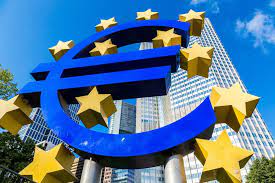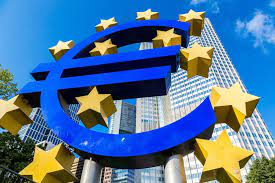
A return of coronavirus infections in Europe is raising concerns that the region's successful economic recovery from the epidemic might be threatened by another harsh winter.
So far, the new Covid-19 wave has had just a minor influence on corporate activity in the eurozone's 19 member nations. According to statistics released Tuesday, the IHS Markit Purchasing Managers' Index, a key barometer of the economy, climbed in November after falling to a six-month low in October.
However, the outlook for the future is dimming. Last week, Austria stated that it will revert to a countrywide lockdown. Infections in Germany are on the rise, raising concerns about the region's biggest economy reimposing its earlier Covid-19 restrictions which impacted its recovery.
"A stronger expansion of business activity in November defied economists' expectations of a slowdown, but is unlikely to prevent the euro zone from suffering slower growth in the fourth quarter, especially as rising virus cases look set to cause renewed disruptions to the economy in December," said Chris Williamson, IHS Markit's chief business economist.
According to the European Commission, consumer confidence in the euro zone decreased "significantly" in November. Companies' forecasts for future economic production "deteriorated to the lowest level since January," according to IHS Markit.
More evidence is needed, according to Ruben Segura-Cayuela, Europe economist at Bank of America, to determine what limits in Europe may entail for the region's economy. He said that as companies and customers learn to manage each wave of Covid-19 infections, the economic burden has decreased.
"We know there will be a reaction, we just don't know if it's going to be the same magnitude," he said. "I would assume, based on what we've seen over the last few months, it's going to be smaller."
In 2020, the epidemic affected Europe particularly hard. The euro zone's economic production plummeted by 6.3 percent, compared to 3.4 percent in the United States.
However, vaccination rates have increased in recent months, and the region has recovered. Between July and September, the euro zone's gross domestic product increased by 2.2 percent over the previous quarter.
According to Jessica Hinds, Europe analyst at Capital Economics, "a lot now hinges on how the scenario evolves in Germany." She believes it's "possible" that Europe's largest economy may enter a shutdown before the end of the year.
"We are likely to see some hit to economic activity just as rising case numbers make consumers more fearful and governments require more stringent Covid pass [screening] for various activities," Hinds said.
To return to work on Wednesday, German employees must provide a negative Covid test, confirmation of immunization, or proof of recovery from the virus. They may not be compensated if they are unable to work from home. Non-vaccinated citizens will be barred from hotels, restaurants, pubs, and shops beginning Saturday, with the exception of grocery stores and pharmacies.
The German industrial sector is also under stress, as supply chain issues continue to plague automakers and other manufacturers.
France may likely impose more Covid-19 limitations after reporting over 30,000 new infections on Tuesday, the highest amount since early August.
Aside from coronavirus outbreaks, Europe is coping with the consequences of China's economic downturn, increasing inflation, and an energy supply shortage that might boost business expenses and make it more expensive to heat homes this winter. This might have a broader impact on consumer spending.
Some beneficial aspects of the recovery, according to Segura-Cayuela, are still being realized. Excess savings amassed during the epidemic, for example, are assisting in mitigating the negative impacts of inflation on people's salaries.
"There are still reopening forces helping growth in the near term," he said.
(Source:www.cnn.com)
So far, the new Covid-19 wave has had just a minor influence on corporate activity in the eurozone's 19 member nations. According to statistics released Tuesday, the IHS Markit Purchasing Managers' Index, a key barometer of the economy, climbed in November after falling to a six-month low in October.
However, the outlook for the future is dimming. Last week, Austria stated that it will revert to a countrywide lockdown. Infections in Germany are on the rise, raising concerns about the region's biggest economy reimposing its earlier Covid-19 restrictions which impacted its recovery.
"A stronger expansion of business activity in November defied economists' expectations of a slowdown, but is unlikely to prevent the euro zone from suffering slower growth in the fourth quarter, especially as rising virus cases look set to cause renewed disruptions to the economy in December," said Chris Williamson, IHS Markit's chief business economist.
According to the European Commission, consumer confidence in the euro zone decreased "significantly" in November. Companies' forecasts for future economic production "deteriorated to the lowest level since January," according to IHS Markit.
More evidence is needed, according to Ruben Segura-Cayuela, Europe economist at Bank of America, to determine what limits in Europe may entail for the region's economy. He said that as companies and customers learn to manage each wave of Covid-19 infections, the economic burden has decreased.
"We know there will be a reaction, we just don't know if it's going to be the same magnitude," he said. "I would assume, based on what we've seen over the last few months, it's going to be smaller."
In 2020, the epidemic affected Europe particularly hard. The euro zone's economic production plummeted by 6.3 percent, compared to 3.4 percent in the United States.
However, vaccination rates have increased in recent months, and the region has recovered. Between July and September, the euro zone's gross domestic product increased by 2.2 percent over the previous quarter.
According to Jessica Hinds, Europe analyst at Capital Economics, "a lot now hinges on how the scenario evolves in Germany." She believes it's "possible" that Europe's largest economy may enter a shutdown before the end of the year.
"We are likely to see some hit to economic activity just as rising case numbers make consumers more fearful and governments require more stringent Covid pass [screening] for various activities," Hinds said.
To return to work on Wednesday, German employees must provide a negative Covid test, confirmation of immunization, or proof of recovery from the virus. They may not be compensated if they are unable to work from home. Non-vaccinated citizens will be barred from hotels, restaurants, pubs, and shops beginning Saturday, with the exception of grocery stores and pharmacies.
The German industrial sector is also under stress, as supply chain issues continue to plague automakers and other manufacturers.
France may likely impose more Covid-19 limitations after reporting over 30,000 new infections on Tuesday, the highest amount since early August.
Aside from coronavirus outbreaks, Europe is coping with the consequences of China's economic downturn, increasing inflation, and an energy supply shortage that might boost business expenses and make it more expensive to heat homes this winter. This might have a broader impact on consumer spending.
Some beneficial aspects of the recovery, according to Segura-Cayuela, are still being realized. Excess savings amassed during the epidemic, for example, are assisting in mitigating the negative impacts of inflation on people's salaries.
"There are still reopening forces helping growth in the near term," he said.
(Source:www.cnn.com)





